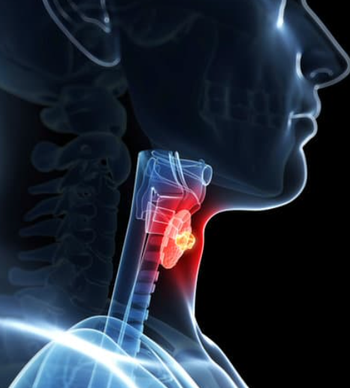
Response Acheivement With Nivolumab Plus Ipilimumab Combo for Clear Cell RCC Linked With Immune Cell–Related Factirs
Data from the TITAN-RCC trial presented at 2022 ASCO GU showed that certain immune cell–related parameters may be predictive of response to nivolumab/ipilimumab in advanced or metastatic clear cell renal cell carcinoma
Analysis of the phase 2 TITAN-RCC trial (NCT02917772) presented during the
Results from the study were presented by Marc-Oliver Grimm, MD of Jena University Hospital at the 2022 American Society of Clinical Oncology Genitourinary Cancers Symposium and revealed that having 4-1BB or LAG-3-expressing T cells at baseline correlated with response to nivolumab induction. Moreover, nivolumab/ipilimumab boosts were associated with a high proportion of PD-L1-expressing myeloid cells and plasmacytoid dendritic cells (pDC) during boost cycles.
Response to immune checkpoint inhibitors in patients with RCC appears to vary from patient to patient. There is a need in the field to identify key predictors of response to immunotherapy. With consideration that a boost of nivolumab plus ipilimumab improved response compared with nivolumab monotherapy in patients with RCC treated in the TITAN-RCC clinical trial,2 investigators assessed characteristics of blood-circulating immune cell subsets within the study population to identify the markers of response.1
TITAN-RCC included 207 patients with ccRCC whose disease was metastatic or locally advanced according to histologically confirmation. Patients were required to have intermediate or high International Metastatic RCC Database Consortium (IMDC) risk, be either untreated or previously treated with 1 prior tyrosine kinase inhibitor, and have measurable disease per RECIST v1.1, and a Karnofsky performance score ≥70.
Baseline characteristics of the intention-to-treat (ITT) population of 207 patients showed a median patient age of 65 years (range, 20-87), and the population was predominantly male (71%). Fifty-three percent of patients entered the study while in the first-line treatment setting and the remaining 47% were second line. In terms of IMDC risk factors, 18% of the ITT population had a Karnofsky performance score of <80%, 65% had an initial RCC diagnosis < 12 months, and laboratory values including hemoglobin, platelet count, neutrophil, and calcium were adequate. Overall, 70% of the ITT population had intermediate-risk disease, 25% had poor-risk disease, and 4.3% had favorable-risk disease.
Among the 137 patients who received an immunotherapeutic boost during the study, the median age was 64 years (range, 20-86), and the cohort was also 71% male. Forty-eight of the patients were the first line and 52% were second line. IMDC risk factors were adequate and similar o the ITT population. Overall, 74% of the boost group had intermediate-risk disease, 21% had poor-risk disease, and 5.1% has favorable-risk disease.
“Patients received nivolumab induction until week 16 and continued with nivolumab maintenance upon remission. Patients who had stable disease or progressive disease or early progressive disease at week 8 continued up to 4 cycles,” explained Grimm during the presentation. The 4 cycles included immunotherapeutic boosts of nivolumab 3 kg/mg with ipilimumab 1 kg/mg in patients who were stable after 4 cycles. Nivolumab maintenance was then continued in these patients at multiple time point during induction and before each boost cycle.
Investigators looked at 198 samples from patients with RCC, 105 of whom were treated in the frontline setting, and 93 of whom were second line. The samples were evaluated using multiparametric flow cytometry for frequency and phenotype of T cell, monocyte, myeloid-derived suppressor cell (MDSC), and dendritic cell (DC) subsets. Further, uni- and multivariable logistic regression modeling was used to look into the association between treatment response and immune parameters.
By flow cytometry, immune response in the Mo, MDSC, CTL, Th, and Treg cells were evaluated. Further, single marker models that were adjusted for age and gender. Data showed that most of the markers investigated had some correlation with immune response except for CD8-positive T cells like TIM-1, VISTA, OX40, CD69, and CD28 compared with PD-1, LAG-3, CTLA-4, and others. In the CD4-positive T-cell category, only VISTA and CD69 were not associated with immune response.
Results for responders to nivolumab induction were split into 3 categories. First, of those with 4-1BB-positive, CD8-positive T cells at baseline, 41 responded to therapy while 106 did not respond (odds ratio [OR] 1.03; 95% CI, 1.01-1.07). Among the patients with 4-1BB-positive, CD4-positive T cells at baseline, there were 43 responders and 106 non-responders (OR, 1.05; 95% CI, 1.02-1.08). In the last category of patients with LAG-3-positive, CD4-positive T cell at baseline, 41 patients had a response to nivolumab induction while 106 did not respond (OR, 1.03; 95% CI, 1.01-1.05).
Looking at CD14-positive monocytes and pDC, at the time of the first boost cycle, patients with CD86-positive cells were most likely to respond to therapy compared with those with CD40-positive cells or PD-L1-positive cells. Also, ICOS positivity did not correlate with response to the nivolumab/ipilimumab boost.
Across the board in CD14-, e-MDSC-, and pDC-expressing cells, PD-L1 expression correlated with non-response to immunotherapy with nivolumab plus ipilimumab boost at cycle 1. Only 4 patients with PD-L1 expression in CD14-positive cells responded compared with 41 nonresponders (OR, 1.22; 95% CI, 1.06-1.58). In patients with PD-L1 expression in e-MDSC, there were 4 responders and 30 nonresponders (OR, 1.44; 95% CI, 1.02-1.41). Finally, in patients who have PD-L1-expressing pDC, there were only 7 responders versus 40 nonresponders (OR, 1.08; 95% CI, 1.01-1.17).
“These immune cell parameters may represent novel predictive biomarkers for the response to nivolumab and or nivolumab/ipilimumab therapy in clear cell RCC,” stated Grimm.
References
- Grimm MO, Kesselmeier M, Leucht K, et al. Novel predictive biomarkers of response to immune checkpoint blockade with nivolumab ± ipilimumab in the TITAN-RCC phase 2 trial. J Clin Oncol. 2022;40(6):367-367. doi: 10.1200/JCO.2022.40.6_suppl.367
- Grimm MO, Esteban E, Barthelemy P, et al. Efficacy of nivolumab/ipilimumab in patients with initial or late progression with nivolumab: Updated analysis of a tailored approach in advanced renal cell carcinoma (TITAN-RCC).J Clin Oncol. 2021;39(suppl 5): 4576-4576. doi: 10.1200/JCO.2021.39.15_suppl.4576
Newsletter
Stay up to date on recent advances in the multidisciplinary approach to cancer.



















































